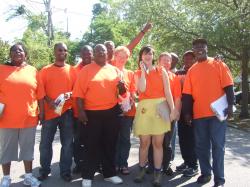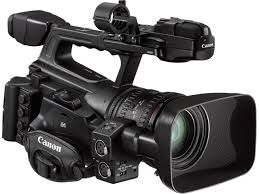 Janie Campbell is Acting President of the Charleston Sanitation Workers Union, Local 1199B, Charleston, South Carolina. City workers there have been waging a 6-year battle to win collective bargaining in order to improve pay and working conditions, especially health and safety, for the 120 sanitation, street, sidewalk and stormwater workers in the the city of Charleston, South Carolina.
Janie Campbell is Acting President of the Charleston Sanitation Workers Union, Local 1199B, Charleston, South Carolina. City workers there have been waging a 6-year battle to win collective bargaining in order to improve pay and working conditions, especially health and safety, for the 120 sanitation, street, sidewalk and stormwater workers in the the city of Charleston, South Carolina.
Sis. Campbell has worked for the city for 13 years as a driver of a sanitation truck. She is one of 14 women, all Black, in the department – a department in most cities dominated by men.
Justice Speaks: What were the issues that made you feel you needed to organize your own union?
Janie Campbell: Our working conditions and health and safety issues consisted of water coolers placed on the truck floors and underneath the trucks where the cooler is easily exposed to roadkill and raw garbage from the the landfill. Most of our trucks do not have air conditioning.. W need better wages and better benefits.
JS: Tell us about the water coolers.
JC: They are on the truck floor inside the cab but the floor is so filthy and the spout is floor level and its very unsanitary. Underneath the truck [the coolers] are in holders but they’re still exposed to raw garbage. The racks they put in now are closed but we had been complaining about this for years.
My supervisor was walking around the yard checking trucks one day andi I called him over; as he approached , i offered him a drink from my truck. He said, “I’m not going to drink from that dirty water.” I was only showing him how filthy it was.
One day, in a meeting, I brought a [nasty] old cooler in. The superintendent kept looking at it but wouldn’t say an thing and they sure ended that meeting fast. it was after the supervisor refused the water that we finally got them put the coolers in the sanitary cages.
JS: What is the starting pay for a Charleston sanitation worker?
JC: The starting pay for a collector [also called a] striker starts at $9.10/hour depending on the worker’s experience.
JS IT could be less?
JC: Oh yeah! Latino workers make $7.00; they work through temp services..
JS: How long do they usually work through the temp agency?
JC: Some have worked almost a year or better; they work on an “as needed basis.”
JS: Do they ever get hired?
JC: Yes, they do. then their salary increases to $9.10 an hour.
JS: Are they part of the union drive?
JC: we’re approaching them now
JS: What’s the pay ranges for the other positions?
JC: Senior drivers start at $13.80/hour; a driver starts at about $12 an hour.
JS: What do collectors make?
JC: A city collector makes the $9.80 but a temp makes $6.80.
JS: Does the city only hire Latino workers through the temporary agencies?
JC: No, they hire U.S. workers there as well.
JS: You mentioned street and stormwater workers….
JC: They are totally different. I’m not sure what they make; we’re still investigating that.
JS: Are they part of the union drive? What is their participation rate like?
JC: When the campaign ran in 2003, there was no problem; but now it’s iffy.
JS: Why?
JC: They were disappointed [the last time around]; when you put in so much and the city didn’t bargain with us, they lost interest. And now that we’ve started again, they’ve got the attitude of wait and see.
JS: What other working condition issues are y’all raising?
JC: The gloves [that we are are issued] because they are so thin that glass, nails or any sharp object can go through them. And inorder to get a new pair, workers have to bring in the old pair.
Most of the trucks do not have air conditioning. After working in the sun all day, workers [who bring their lunch need a cool place to take their lunch.
JS: Everybody eats their lunch in the truck?
JC: Some do; some don’t.
JS: By the way, what the average temperature during the summer?
JC: 100 degrees, with a 110 to 115 degree heat index.
The horses have the privilege of being [brought in] at 99 degrees and human employees have to continue working to get the route out. Charleston is a tourist town with horses and buggies; so if the temperature is too high, the buggies do not operate until the heat goes down.
JS: Does management allow you to stop and take breaks?
JC: Oh yeah; But it should be that you either come in and work early, like at 4:30 or 5 o’clock in the morning. They tell us to come in at 6am but what is a little half hour going to do? But we have asked for the earlier time [to be able to clock in.]
JS: What is the most recent action that y’all been carrying out in the campaign?
JC: We presented a resolution and memorandum to the mayor and the city council [with 4,000 city residents’ signatures] saying that we would like them to accept it so we can collectively bargain. i just got the news that our resolution was denied.



